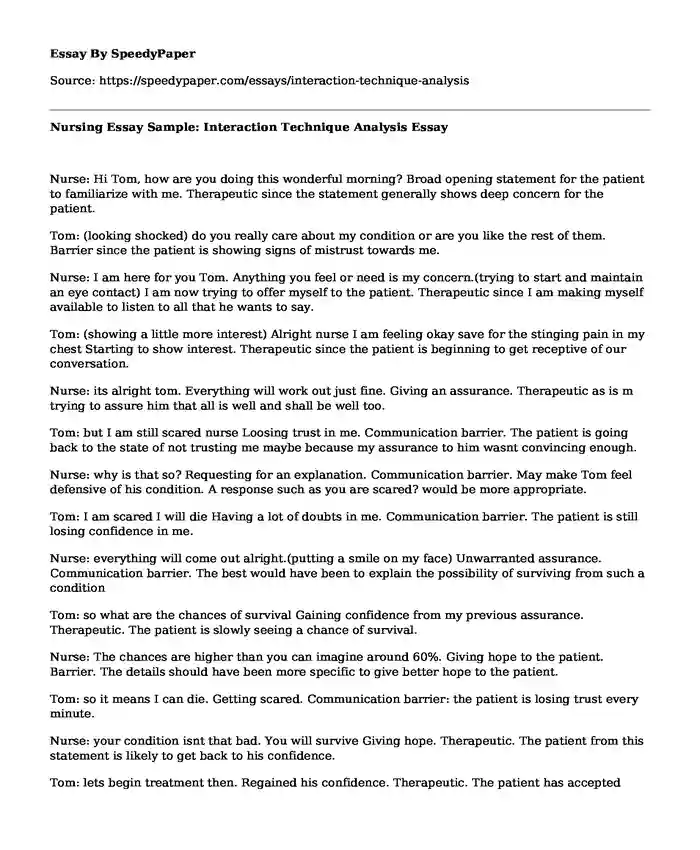Nurse: Hi Tom, how are you doing this wonderful morning? Broad opening statement for the patient to familiarize with me. Therapeutic since the statement generally shows deep concern for the patient.
Tom: (looking shocked) do you really care about my condition or are you like the rest of them. Barrier since the patient is showing signs of mistrust towards me.
Nurse: I am here for you Tom. Anything you feel or need is my concern.(trying to start and maintain an eye contact) I am now trying to offer myself to the patient. Therapeutic since I am making myself available to listen to all that he wants to say.
Tom: (showing a little more interest) Alright nurse I am feeling okay save for the stinging pain in my chest Starting to show interest. Therapeutic since the patient is beginning to get receptive of our conversation.
Nurse: its alright tom. Everything will work out just fine. Giving an assurance. Therapeutic as is m trying to assure him that all is well and shall be well too.
Tom: but I am still scared nurse Loosing trust in me. Communication barrier. The patient is going back to the state of not trusting me maybe because my assurance to him wasnt convincing enough.
Nurse: why is that so? Requesting for an explanation. Communication barrier. May make Tom feel defensive of his condition. A response such as you are scared? would be more appropriate.
Tom: I am scared I will die Having a lot of doubts in me. Communication barrier. The patient is still losing confidence in me.
Nurse: everything will come out alright.(putting a smile on my face) Unwarranted assurance. Communication barrier. The best would have been to explain the possibility of surviving from such a condition
Tom: so what are the chances of survival Gaining confidence from my previous assurance. Therapeutic. The patient is slowly seeing a chance of survival.
Nurse: The chances are higher than you can imagine around 60%. Giving hope to the patient. Barrier. The details should have been more specific to give better hope to the patient.
Tom: so it means I can die. Getting scared. Communication barrier: the patient is losing trust every minute.
Nurse: your condition isnt that bad. You will survive Giving hope. Therapeutic. The patient from this statement is likely to get back to his confidence.
Tom: lets begin treatment then. Regained his confidence. Therapeutic. The patient has accepted treatment from me.
Nurse: come lets start before your kids get back home from school Breaking the monotony of a doctor-patient relationship to a friendship relationship. Therapeutic. This is to enable me have a smooth time during the treatment process.
The interpersonal relationship was a great success. However, there was a great failure on my part at the point of giving an assurance. I will avoid questions such as why are you scared since it gives the patient time to create a defensive reasoning. Instead, I will begin with you are scared. I will also try to be more detailed and specific to give both hope and assurance to the patient.
References
LAN, S. (2004). (2nd Ed.). New York: Psychiatric-Mental Health Nursing: An Interpersonal Approach Oxford University press.
Cite this page
Nursing Essay Sample: Interaction Technique Analysis. (2020, Oct 12). Retrieved from https://speedypaper.com/essays/interaction-technique-analysis
Request Removal
If you are the original author of this essay and no longer wish to have it published on the SpeedyPaper website, please click below to request its removal:
- Free Essay with the Book Review of The Souls of Black Folk
- Learning Kansas History Through Online Games, Essay Example
- Rear Window, Movie Review Essay Example
- Economics Essay Example: Free Enterprise and Innovation, 1790-2010
- Essay Sample on Philosophy in Criminal Justice
- Essay Example on The Tempest by Shakespeare
- Paper Example on Manning University
Popular categories





